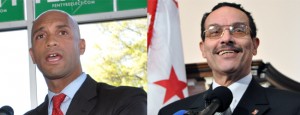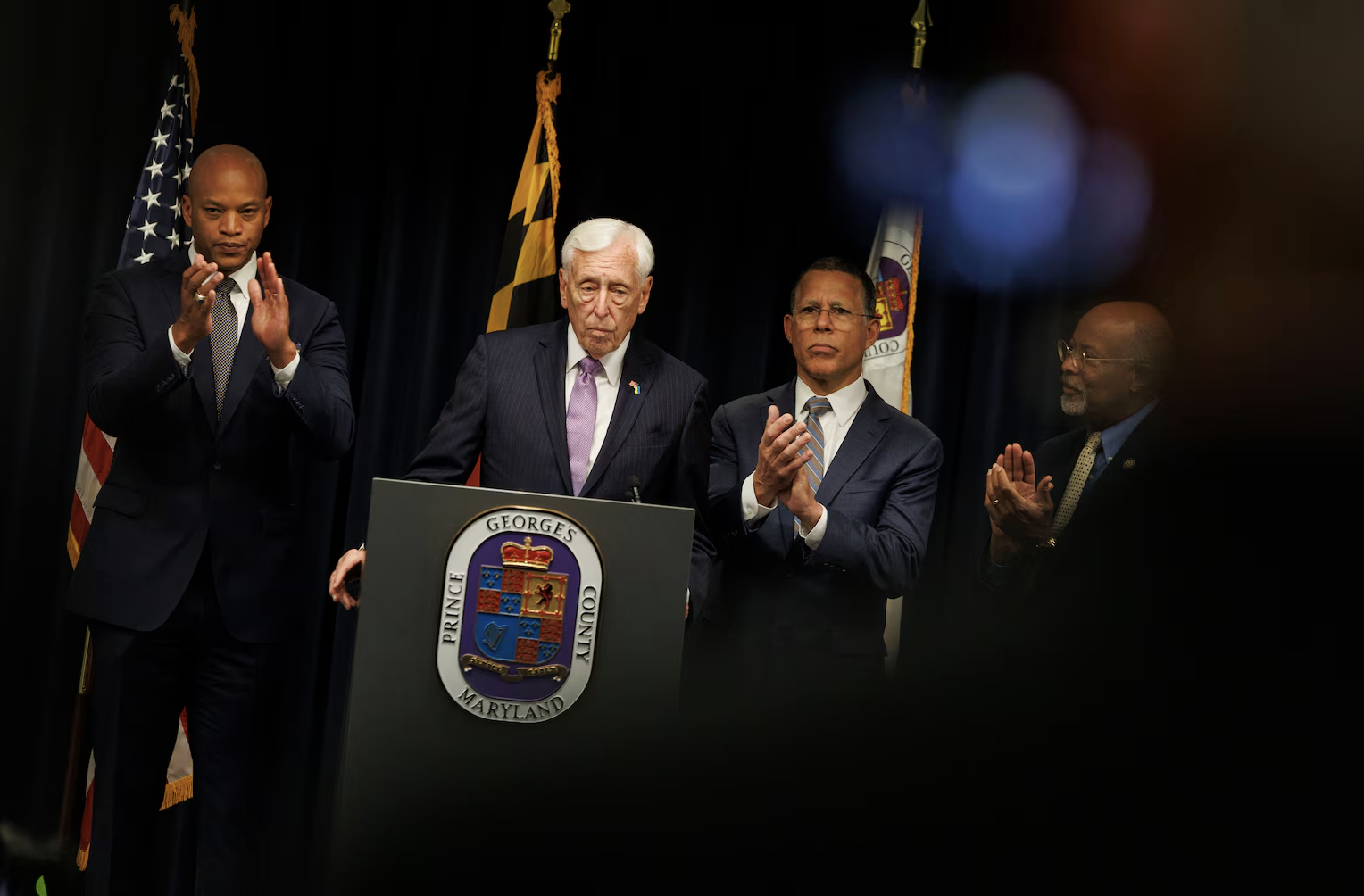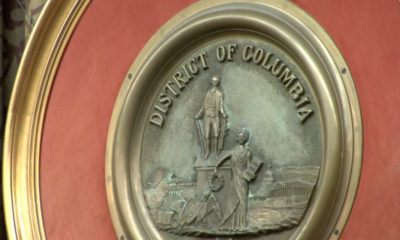Local
Fenty leads Gray by 6 points in Blade poll
Small sample hints at gay vote in D.C. mayor’s race

Mayor Adrian Fenty leads his primary opponent D.C. City Council Chair Vincent Gray in an unscientific straw poll of LGBT voters the Blade conducted during Capital Pride. (Washington Blade photos by Michael Key)
Participants in an unscientific straw poll conducted by the Washington Blade at the Capital Pride street festival June 13 said they would vote for D.C. Mayor Adrian Fenty over his chief rival, City Council Chairman Vincent Gray, 40.7 percent to 33.8 percent.
The poll shows Fenty with a 6.9 percent lead among the 145 mostly LGBT festival attendees that participated in the poll.
But nearly 25 percent of the straw poll participants indicated they had yet to decide who would get their vote for mayor in the Sept. 14 Democratic primary. Because the overwhelming majority of D.C. voters are registered Democrats, the primary almost always predicts the winner in the November general election.
Mayoral contender Leo Alexander, a former TV news anchor who supports bringing the city’s same-sex marriage law before voters in a ballot initiative, received support from less than 1 percent of the straw poll respondents. Eight other, lesser-known mayoral candidates received no votes in the straw poll.
In the hotly contested race for City Council chairman, respondents in the Blade straw poll indicated they would vote for at-large City Council member Kwame Brown over his main rival, former Ward 5 Council member Vincent Orange, 37.2 percent to 8.3 percent. Slightly more than 43 percent said they were undecided in that contest.
Two lesser-known candidates in the race, Dorothy Douglas and Calvin Gurley, received 1.3 percent and 0.7 percent respectively.
Orange came out against legislation to legalize same-sex marriage in the District when he ran for mayor in 2006, and denounced his mayoral rivals, including Fenty, who supported gay marriage. He said this year that he’s changed his mind on the matter and now supports the same-sex marriage bill that the Council passed and Fenty signed.
In the race for at-large Council member, incumbent Phil Mendelson outscored gay challenger Clark Ray, 45.1 percent to 13.9 percent, among straw poll respondents. About 35 percent said they were undecided in the race. At-large candidate Donna Jean Alston received 2.8 percent of the straw poll vote, with candidates Kelvin Robinson and Will Ross receiving no votes.
The 145 respondents in the Blade’s D.C. election straw poll comprised a far smaller number than those who participated in a separate Blade presidential approval rating poll also conducted at the Capital Pride street festival.
The 145 respondents are too few to make the straw poll a statistically valid sample of the LGBT D.C. residents who attended the Capital Pride festival. But Blade editor Kevin Naff said the straw poll provides the only available glimpse so far into where LGBT voters stand in the race for mayor and City Council chair and the contest for an at-large Council seat in which an openly gay candidate is considered to have a shot at winning.
No city polls conducted to date, including those by the Washington Post, have included information about the LGBT vote, which is considered influential in D.C. elections.
A total of 560 people completed the Obama approval poll, which asked respondents to disclose whether they approve or disapprove of President Barack Obama’s handling of LGBT issues as well as all matters. The Blade is planning to release the results of that poll later this month.
The greater participation in the presidential approval poll suggests that a significantly larger percentage of people attending the Capital Pride street festival were from jurisdictions outside D.C., such as the Virginia and Maryland suburbs and other mid-Atlantic states.
Blade staff members invited Capital Pride attendees to participate in the poll as the attendees walked past the Blade booth at the festival. All attendees could complete the presidential approval poll, but only attendees additionally identifying themselves as D.C. residents were allowed to participate in the D.C. election poll.
Among the 145 respondents in the Blade D.C. election straw poll, about 73 percent identified as being gay male, 13 percent were lesbian, about 5 percent were bisexual, 0.7 percent were transgender, 1.4 percent identified as queer, about 8 percent were straight, and 0.7 percent identified as other.
By race and ethnicity, about 77 percent of respondents identified as white, 17 percent were black, about 7 percent were Latino, 1.4 percent were Asian-Pacific Islander, and 2.7 percent identified as other.
In a breakdown by age, about 21 percent of respondents identified as being between 17 and 29; about 52 percent were between 30 and 49; about 24 percent were between 50 and 64; and 0.38 percent were 65 or older.
Just 119 of the 145 respondents answered a question asking them to identify the ward in which they live. By ward, the breakdown was 20 from Ward 1; 36 from Ward 2; 12 from Ward 3; 10 from Ward 4; 14 from Ward 5; 23 from Ward 6; three from Ward 7; and one from Ward 8.
The small representation of respondents from Wards 7 and 8 suggests that Gray might have received more support in the Blade poll had more people from those two wards participated in the poll. Other public opinion polls have shown Gray leading Fenty by a wide margin in wards 7 and 8, and gay activists living in the two wards have said they believe gays in the two wards also back Gray by a significant margin.
But with some political pundits predicting voters will be nearly evenly divided citywide between Fenty and Gray as the September primary approaches, the gay vote could be a key factor in the outcome of the election.
Although Gray won the endorsement last month of the Gertrude Stein Democratic Club, the city’s largest LGBT political group, many believe LGBT voters are closely divided over the mayoral contest. A significant number of LGBT activists have yet to take sides in the mayoral race, a development backed up by the Blade poll showing that 24.8 percent of respondents are undecided in the race.
The Blade poll finding that Ray, a gay Democratic activist and former D.C. Department of Parks & Recreation Director, is trailing Mendelson by more than 30 points could mean any of several factors are at play.
Mendelson supporters have predicted LGBT voters will back Mendelson because of his strong support for LGBT rights, including his leadership in shepherding the gay marriage bill through the Council last year in his role as chair of the committee with jurisdiction over the bill.
Ray’s poor showing in the Blade poll could also be due to his lack of name recognition compared to Mendelson, who has sat on the Council for nearly 12 years.
Gay Democratic activist Peter Rosenstein, a campaign adviser for Ray, said the sample was too small to be an accurate predictor in the election.
Rosenstein said the only aspect of the poll that could be a factor is its high number of undecided voters in the mayoral and at-large Council races.
“That’s not a good sign for an incumbent like Mendelson, who has been in office for 12 years,” he said.
Gay activist Bob Summersgill, a Mendelson supporter, said that while the number of participants in the Blade poll is small, its composition of mostly white gay men is a demographic for which Ray should have made a stronger showing as a gay candidate.
“Phil beat Ray three to one in what should be Clark Ray’s best demographic,” Summersgill said. “And Ray even lost to undecided, two to one. I think that’s pretty significant and shows the lack of name recognition and lack of seriousness which the community is generally giving him.”
Yet Summersgill and Jeffrey Richardson, president of the Stein Club, noted that the large number of respondents to the Blade poll saying they were undecided in the Council chair and at-large Council races also indicates those two races have received far less media coverage and voter attention than the widely publicized mayoral race between Fenty and Gray.
“The reality is Phil Mendelson is the incumbent with higher name recognition,” Richardson said. “And even though Clark Ray was a director of the Department of Parks & Recreation, because Phil is the incumbent and has done so much legislatively and has been vocal on so many different issues, even marriage equality, people know and recognize what he has done.
“So Clark Ray has a lot of ground to gain in trying to overcome the name-recognition battle,” Richardson said. “But in regards to where people really would be with one over the other, I’m not so certain.”
The Stein Club is scheduled to hold its endorsement meeting and vote on the at-large Council and Council chair races on Monday at Town nightclub in D.C.
Gay Democratic activist Lane Hudson, a volunteer in Gray’s mayoral campaign, said the Blade poll shows strong potential for Gray, even though it reveals him to be trailing Fenty among the sample of Pride festival goers.
“I think the results show that there’s a wide opening for Vince Gray to win a significant majority of the LGBT vote if he can show that he is empathetic to the issues that are important to our community, such as a strong response from the mayor’s office on hate crimes, a comprehensive HIV/AIDS prevention strategy, and LGBT youth and schools,” Hudson said.
Hudson and other Gray supporters have said Fenty’s record is weak on those issues.
“It’s significant because those are people who are not necessarily the most active. If you look at the most active in our community — the Stein Club — Vince got 63 percent,” he said. “So as the gay community learns more about candidates in the race, I think Vince Gray’s numbers will go up significantly.”
Deacon Maccubbin, former owner of D.C.’s Lambda Rising bookstore and a Fenty supporter, said he wasn’t surprised at the Blade poll’s finding that a large number of respondents are undecided in the mayoral race.
“But I have seen movement toward Fenty and I think he’ll do fine,” he said. “I think the gay vote is going to go the same way the city vote goes.
“I think that between the two candidates, there’s not a whole lot of difference on gay-specific issues and consequently Adrian Fenty has come through and done what he promised he was going to do. And as a result, I think he’s earned the support of the community.”
Virginia
Gay Va. State Sen. Ebbin resigns for role in Spanberger administration
Veteran lawmaker will step down in February

Alexandria Democrat Adam Ebbin, who has served as an openly gay member of the Virginia Legislature since 2004, announced on Jan. 7 that he is resigning from his seat in the State Senate to take a job in the administration of Gov.-Elect Abigail Spanberger.
Since 2012, Ebbin has been a member of the Virginia Senate for the 39th District representing parts of Alexandria, Arlington, and Fairfax counties. He served in the Virginia House of Delegates representing Alexandria from 2004 to 2012, becoming the state’s first out gay lawmaker.
His announcement says he submitted his resignation from his Senate position effective Feb. 18 to join the Spanberger administration as a senior adviser at the Virginia Cannabis Control Authority.
“I’m grateful to have the benefit of Senator Ebbin’s policy expertise continuing to serve the people of Virginia, and I look forward to working with him to prioritize public safety and public health,” Spanberger said in Ebbin’s announcement statement.
She was referring to the lead role Ebbin has played in the Virginia Legislature’s approval in 2020 of legislation decriminalizing marijuana and the subsequent approval in 2021of a bill legalizing recreational use and possession of marijuana for adults 21 years of age and older. But the Virginia Legislature has yet to pass legislation facilitating the retail sale of marijuana for recreational use and limits sales to purchases at licensed medical marijuana dispensaries.
“I share Governor-elect Spanberger’s goal that adults 21 and over who choose to use cannabis, and those who use it for medical treatment, have access to a well-tested, accurately labeled product, free from contamination,” Ebbin said in his statement. “2026 is the year we will move cannabis sales off the street corner and behind the age-verified counter,” he said.
Maryland
Steny Hoyer, the longest-serving House Democrat, to retire from Congress
Md. congressman served for years in party leadership

By ASSOCIATED PRESS and LISA MASCARO | Rep. Steny Hoyer of Maryland, the longest-serving Democrat in Congress and once a rival to become House speaker, will announce Thursday he is set to retire at the end of his term.
Hoyer, who served for years in party leadership and helped steer Democrats through some of their most significant legislative victories, is set to deliver a House floor speech about his decision, according to a person familiar with the situation and granted anonymity to discuss it.
“Tune in,” Hoyer said on social media. He confirmed his retirement plans in an interview with the Washington Post.
The rest of this article can be found on the Baltimore Banner’s website.
District of Columbia
Kennedy Center renaming triggers backlash
Artists who cancel shows threatened; calls for funding boycott grow

Efforts to rename the Kennedy Center to add President Trump’s name to the D.C. arts institution continue to spark backlash.
A new petition from Qommittee , a national network of drag artists and allies led by survivors of hate crimes, calls on Kennedy Center donors to suspend funding to the center until “artistic independence is restored, and to redirect support to banned or censored artists.”
“While Trump won’t back down, the donors who contribute nearly $100 million annually to the Kennedy Center can afford to take a stand,” the petition reads. “Money talks. When donors fund censorship, they don’t just harm one institution – they tell marginalized communities their stories don’t deserve to be told.”
The petition can be found here.
Meanwhile, a decision by several prominent musicians and jazz performers to cancel their shows at the recently renamed Trump-Kennedy Center in D.C. planned for Christmas Eve and New Year’s Eve has drawn the ire of the Center’s president, Richard Grenell.
Grenell, a gay supporter of President Donald Trump who served as U.S. ambassador to Germany during Trump’s first term as president, was named Kennedy Center president last year by its board of directors that had been appointed by Trump.
Last month the board voted to change the official name of the center from the John F. Kennedy Memorial Center For The Performing Arts to the Donald J. Trump And The John F. Kennedy Memorial Center For The Performing Arts. The revised name has been installed on the outside wall of the center’s building but is not official because any name change would require congressional action.
According to a report by the New York Times, Grenell informed jazz musician Chuck Redd, who cancelled a 2025 Christmas Eve concert that he has hosted at the Kennedy Center for nearly 20 years in response to the name change, that Grenell planned to arrange for the center to file a lawsuit against him for the cancellation.
“Your decision to withdraw at the last moment — explicitly in response to the Center’s recent renaming, which honors President Trump’s extraordinary efforts to save this national treasure — is classic intolerance and very costly to a non-profit arts institution,” the Times quoted Grenell as saying in a letter to Redd.
“This is your official notice that we will seek $1 million in damages from you for this political stunt,” the Times quoted Grenell’s letter as saying.
A spokesperson for the Trump-Kennedy Center did not immediately respond to an inquiry from the Washington Blade asking if the center still planned to file that lawsuit and whether it planned to file suits against some of the other musicians who recently cancelled their performances following the name change.
In a follow-up story published on Dec. 29, the New York Times reported that a prominent jazz ensemble and a New York dance company had canceled performances scheduled to take place on New Year’s Eve at the Kennedy Center.
The Times reported the jazz ensemble called The Cookers did not give a reason for the cancellation in a statement it released, but its drummer, Billy Hart, told the Times the center’s name change “evidently” played a role in the decision to cancel the performance.
Grenell released a statement on Dec. 29 calling these and other performers who cancelled their shows “far left political activists” who he said had been booked by the Kennedy Center’s previous leadership.
“Boycotting the arts to show you support the arts is a form of derangement syndrome,” the Times quoted him as saying in his statement.
-

 District of Columbia4 days ago
District of Columbia4 days agoTwo pioneering gay journalists to speak at Thursday event
-

 National3 days ago
National3 days agoWhat to watch for in 2026: midterms, Supreme Court, and more
-

 Colombia4 days ago
Colombia4 days agoBlade travels to Colombia after U.S. forces seize Maduro in Venezuela
-

 a&e features4 days ago
a&e features4 days agoQueer highlights of the 2026 Critics Choice Awards: Aunt Gladys, that ‘Heated Rivalry’ shoutout and more




















